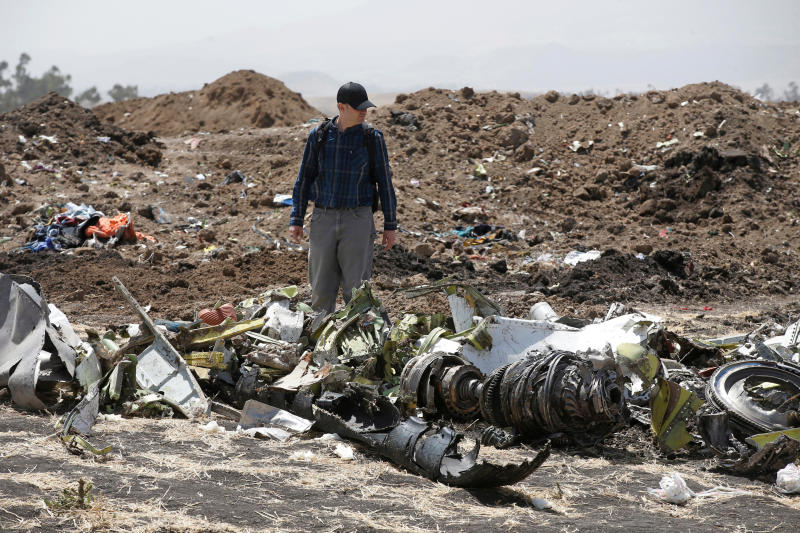What we know about Boeing 737 Max crash in Ethiopia and what comes next
Sign up now: Get ST's newsletters delivered to your inbox

Investigators search through the debris at the scene of the Ethiopian Airlines flight ET 302 plane crash, near the town of Bishoftu, southeast of Addis Ababa, Ethiopia, on March 12, 2019.
PHOTO: REUTERS
LONDON (REUTERS) - More than 300 Boeing 737 Max 8 and Max 9 passenger jets around the world have been taken out of service following two fatal crashes over the past five months in Ethiopia and Indonesia that killed almost 350 people in all.
The causes of both crashes are still under investigation. One of the biggest unanswered questions: Was the plane's software to blame?
WHAT WE KNOW
- Boeing has stopped delivery of all new Max jets to its customers.
- Satellite data gathered from the Ethiopian Airlines flight and evidence from the crash site showed similarities with a Lion Air accident in Indonesia, which prompted the US Federal Aviation Administration to ground all Boeing Max jets in service.
- Investigators have found a piece of a stabiliser in the wreckage of the Ethiopian jet with the trim set in an unusual position similar to that of the Lion Air plane, two sources familiar with the matter said.
- The pilot of the Ethiopian Airlines flight had reported internal control problems and received permission to return. The pilot of the Lion Air flight had also asked to return not along after taking off from Jakarta.
- The Ethiopian Airlines flight had an unusually high speed after take-off before the plane reported problems and asked permission to climb quickly, said a source who has listened to the air traffic control recording.
- A voice from the cockpit requested to climb to 14,000 feet above sea level - about 6,400 feet above the airport - before urgently asking to return, the source told Reuters on condition of anonymity. The plane vanished from radar at 10,800 feet.
- In Paris, France's BEA air accident investigation agency said data from the jet's cockpit voice recorder has been successfully downloaded. The French agency said in a tweet it had not listened to the audio files and that the data had been transferred to Ethiopian investigators.
- Indonesia plans to move up by about a month the release of an investigation report on the Lion Air crash, which killed all 189 on board, its transport safety committee said. It now plans to release the report between July and August, ahead of its previous schedule of between August and September.
- Following the Lion Air crash in October, Boeing said it was preparing a software upgrade for the jets. After the Ethiopia crash, the company said it would deploy that upgrade across the fleet in the coming weeks.
- Boeing maintains its new, fuel-efficient jets are safe, but supported the FAA decision to ground them. Fearing a financial hit and brand damage, investors have wiped about US$26 billion (S$35.2 billion) off the company's market value.
- Ethiopian Airlines said on March 16 that DNA testing of the remains of the passengers may take up to six months.
WHAT'S NEXT?
- US lawmakers said the planes could be grounded for weeks to upgrade the software and install it in every plane.
- Boeing plans to release upgraded software for its 737 Max in a week to 10 days, sources familiar with the matter said on Saturday (March 16).
- No lawsuits have been filed since the crash of Ethiopian Airlines flight 302, but some plaintiffs' lawyers said they expect that Boeing will be sued in the US.
- Investigators are expected to release a preliminary report based on information they glean from the data and cockpit recordings captured by the two black boxes.
- A decision will be made by countries about whether and when to lift the grounding of the Boeing jets based on that information.


